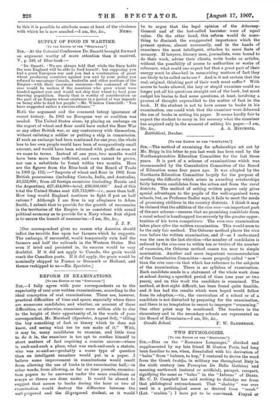REFORM IN EXAMINATIONS.
[To THE EDITOR OF THE "SPECTATOR."] SIR,—I fully agree with your correspondents as to the superiority of oral over written examinations, according to the ideal conception of oral examinations. There are, however, practical difficulties of time and space, especially where there are numerous candidates, and whether, on account of these difficulties, or otherwise, examiners seem seldom able to rise to the height of their opportunity of, in the words of your correspondent, Mr. Marshall (Spectator, August 3rd), " telling the boy something of fact or theory which he does not know, and seeing what use he can make of it." With, it may be, many candidates to examine, and little time to do it in, the examiner is too apt to confine himself to short matters of fact requiring a concise answer—where is such-and-such a place, what was such-and-such a statute, who was so-and-so—probably a worse type of question than an intelligent examiner would put. in a paper. I believe some improvement in examinations would result from allowing the use of books in the examination. ball,—in other words, from allowing, as far as time permits, examina- tion papers to• be answered under the .same conditions as essays or theses are done under. It would be absurd. to suggest that access to books during the hour or, two of examination would destroy the difference between the well-prepared and the ill-prepared student, as it would
be to argue that the legal opinion of the Attorney- General and of the last-called barrister were of equal value. - On the other hand, this reform would do some- thing to diminish the exaggerated importance whiCh the present system, almost necessarily, and in the hands of examiners the most intelligent, attaches to mere feats of memory. If lawyers, literary men, journalists, were bound to do their work, advise their clients, write books or articles, without the possibility of access to authorities or works of reference, what could one expect but that a great part-of their energy must be absorbed in memorising matters of fact they are likely to be called on to use ? And is it not certain that the real, original, thinking part of their work must suffer ? With access to books allowed, the lazy or stupid examiner could no longer put all his questions straight out of the book, -but must cudgel his brains to find some questions, at least, involving a process of thought superadded to the matter of faot in the book. If the student is not to have access to books in his examination, one could wish that the examiner were debarred the use of books in setting his paper. It seems hardly fair to expect the student to carry in his memory what the examiner has acquired only in the moment of setting his paper.—I am,


































 Previous page
Previous page